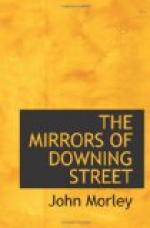No good man of my acquaintance is more powerfully convinced of the goodness of British nature. He watches the British people with an abiding affection. He believes that they possess, even those of them who appear most degraded and sordid, the foundational virtues of Christian character—a love of justice, an instinct for kindness, and faith in truth. He knows that they are more capable than any other people in Europe of generous self-sacrifice, and that any absence of grace in their manner which must distress the superficial observer comes rather of a passion for honesty than a lack of beauty. And this knowledge of his goes with the conviction that no man will ever appeal to the British nation in vain who bases his appeal on justice, fair play, and charity. What a nation to lead! What an inspiration for a true leader!
He is convinced that no moral appeal has ever been made to the British people in vain. And yet he has never made that appeal. With grief and sorrow he watches the stampeding of the nation he so deeply admires into murderous and indiscriminate hatred of our enemies in the late war. He saw the majority of the British people’s war-like mood degraded and vulgarized by the propaganda of hate. But he made no move to save the national honour. The better part, and as I firmly believe the greater part, of the nation was waiting for moral leadership: particularly were the young men of the nation who marched to death with the purest flame of patriotism in their hearts hungering for such leadership; but Lord Robert Cecil, the one man in Parliament who might have sounded that note, was silent. The voice that should have made Britain’s glory articulate, the voice that might have brought America into the War in 1914 and rendered Germany from the outset a house divided against itself, was never heard. Lord Robert Cecil looked on, and Mr. Lloyd George sprang into the prize-ring with his battle-cry of the knock-out blow.
I wonder if even the sublimest humility can excuse so fatal a silence. Great powers have surely great responsibilities.
I remember speaking to Lord Robert on one occasion of the shooting of Miss Cavell—a brutal act which distressed him very deeply. I said I thought we weakened our case against Germany by speaking of that atrocious act as a “murder,” since by the rules of war, as she herself confessed, Miss Cavell incurred the penalty of death. He replied: “What strikes me as most serious in that act is not so much that the Germans should think it no crime to shoot a woman, but that they should be wholly incapable of realizing how such an atrocious deed would shock the conscience of the world. They were surprised—think of it!—by the world’s indignation!”




